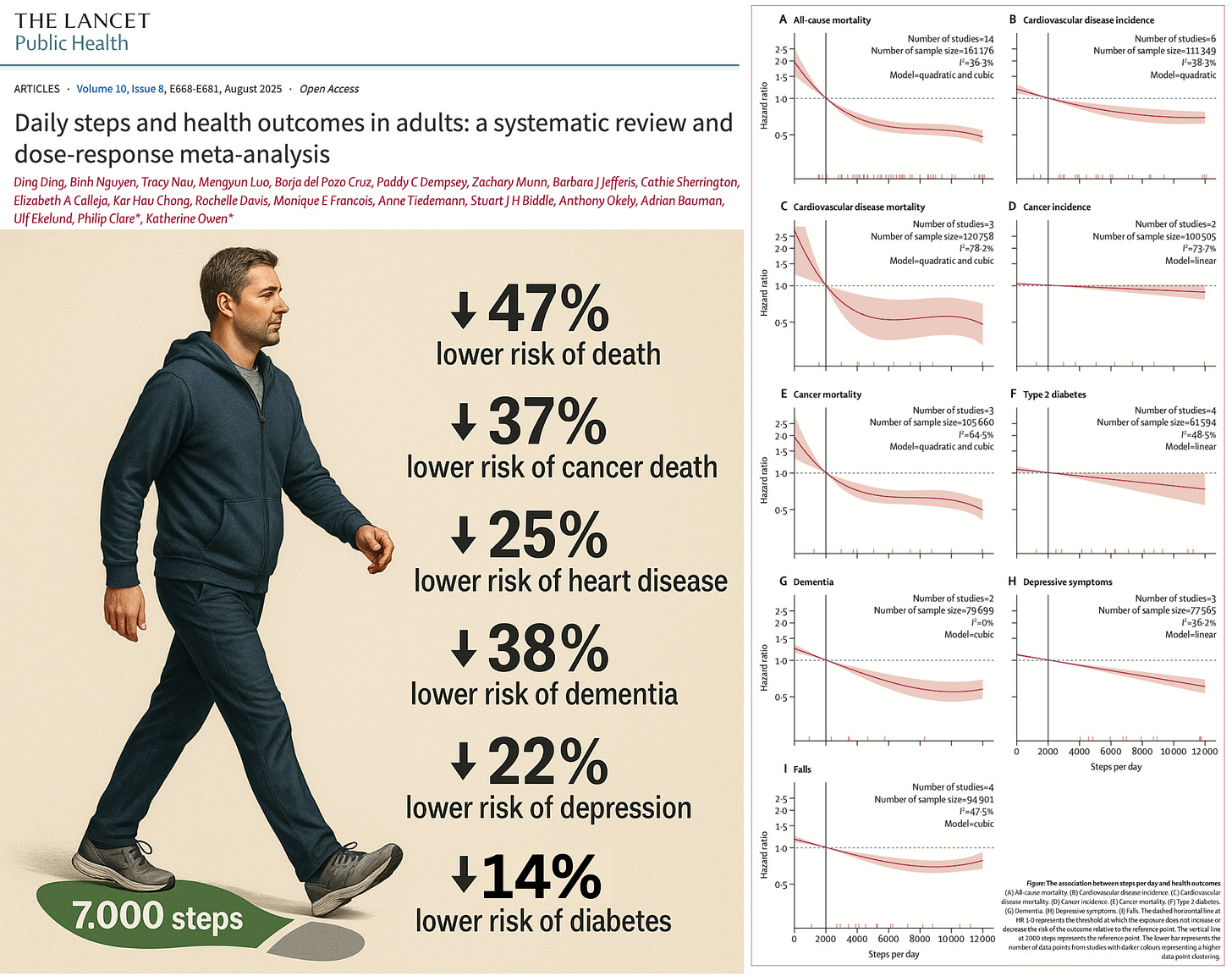NEW STUDY: Walking 7,000 Steps Daily Cuts Risk of Death, Cancer Death, Heart Disease, Dementia, Depression & Diabetes
Landmark meta‑analysis of nearly 1 million people finds walking reduces death risk by almost half and protects against many major diseases.
This article originally appeared on Focal Points and was republished with permission.
Guest post by Nicolas Hulscher, MPH
A new peer‑reviewed study titled, Daily steps and health outcomes in adults: a systematic review and dose-response meta-analysis, published in The Lancet Public Health, has delivered the most comprehensive answer yet to the question: How many steps a day do we really need for better health?
This largest and most comprehensive synthesis to date included meta‑analyses of data from 24 cohorts across eight major health outcomes, drawing from nearly one million participants worldwide. Researchers mapped the precise relationship between daily step counts and risks for all‑cause mortality, cardiovascular disease, cancer, type 2 diabetes, dementia, depression, and falls—making it the most detailed look yet at how walking impacts long‑term health.
They found that while 10,000 steps offers extra protection for some outcomes, significant health benefits start much earlier—and 7,000 steps/day delivers the bulk of the risk reduction for most conditions:
KEY TAKEAWAYS
At ~7,000 steps/day compared with 2,000 steps/day:
47% lower risk of dying from any cause — HR 0.53 (95% CI 0.46–0.60) | 14 studies
25% lower risk of developing cardiovascular disease — HR 0.75 (0.67–0.85) | 6 studies
47% lower risk of dying from cardiovascular disease — HR 0.53 (0.37–0.77) | 3 studies
6% lower risk of developing cancer (not statistically significant) — HR 0.94 (0.87–1.01) | 2 studies
37% lower risk of dying from cancer — HR 0.63 (0.55–0.72) | 3 studies
14% lower risk of developing type 2 diabetes — HR 0.86 (0.74–0.99) | 4 studies
38% lower risk of developing dementia — HR 0.62 (0.53–0.73) | 2 studies
22% lower risk of developing depressive symptoms — HR 0.78 (0.73–0.83) | 3 studies
28% lower risk of having a fall — HR 0.72 (0.65–0.81) | 4 studies
DOSE–RESPONSE INSIGHTS
Benefits start as low as 3,000–4,000 steps/day — even small increases from sedentary levels bring measurable health improvements.
Risk reductions plateau for some outcomes around 7,000 steps/day, meaning extra steps bring smaller gains for certain conditions.
For all-cause mortality, cancer mortality, dementia, and depression, benefits keep increasing toward 10,000+ steps/day.
CONCLUSIONS
Every step matters—even small increases from low activity levels can deliver measurable health benefits.
7,000 steps/day is an achievable and highly effective target for most adults, linked to substantial reductions in the risk of death, chronic disease, and functional decline.
10,000 steps/day can provide extra protection for certain outcomes—such as dementia, cancer mortality, and depression—and is a worthwhile goal for those able to sustain it.
This landmark analysis reinforces that daily movement is one of the most powerful, low‑cost tools we have to lower the risk of multiple leading causes of death and disability.
Epidemiologist and Foundation Administrator, McCullough Foundation
www.mcculloughfnd.org
Please consider following both the McCullough Foundation and my personal account on X (formerly Twitter) for further content.
Copyright 2025 Focal Points



